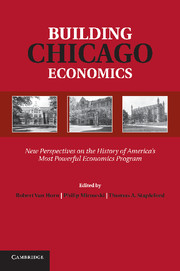 Building Chicago Economics
Building Chicago Economics from Part Four - Debating “Chicago Neoliberalism”
Published online by Cambridge University Press: 05 November 2011
[M]ay I suggest that no greater damage can be done to the interests of American “Big Business” than to give them the impression that any substantial fraction of the free members (i.e., not in the way of government, or of special economic interests) of the American economic profession believes that the present role of “Big Business” in the American economy is a healthy or durable one.
– Jacob VinerWhile at the University of Chicago from 1916 to 1917 and from 1919 to 1946, Jacob Viner became famous for his teaching of “Economics 301,” a price theory course, which, as Paul Samuelson (, 6) remembered it, was “celebrated for Viner’s ferocious manhandling of students, in which he not only reduced women to tears but on his good days drove returned paratroopers into hysteria and paralysis.” The folklore of the Chicago School claims that through this course Viner enlightened and inspired future Chicago economists, such as Milton Friedman, George Stigler, and Aaron Director. For example, about Director, Ronald Coase states that Jacob Viner’s price theory course “swept away like chaff in a windstorm the nebulous idealism … of [Director’s youth]” (1998, 602).
Although Viner may have initially inspired the leaders of the postwar Chicago School, it would be a mistake to assume that Viner was in full agreement with or closely tied to this school. About twenty years after he left the University of Chicago, Viner recalled that he had heard “rumors about a ‘Chicago School’” that was engaged in an “organized battle” against collectivism. Viner stated that he “remained skeptical” about this until he attended a 1951 conference at the Chicago Law School, which Aaron Director and Edward Levi headed and the Volker Fund financed. “From then on,” Viner wrote, “I was willing to consider the existence of a ‘Chicago School,’ (but one not confined to the economics department and not embracing all of the department).” Viner added that: “But at no time was I consciously a member of it, and it is my vague impression that if there was such a school it did not regard me as a member, or at least a loyal and qualified member.”
To save this book to your Kindle, first ensure [email protected] is added to your Approved Personal Document E-mail List under your Personal Document Settings on the Manage Your Content and Devices page of your Amazon account. Then enter the ‘name’ part of your Kindle email address below. Find out more about saving to your Kindle.
Note you can select to save to either the @free.kindle.com or @kindle.com variations. ‘@free.kindle.com’ emails are free but can only be saved to your device when it is connected to wi-fi. ‘@kindle.com’ emails can be delivered even when you are not connected to wi-fi, but note that service fees apply.
Find out more about the Kindle Personal Document Service.
To save content items to your account, please confirm that you agree to abide by our usage policies. If this is the first time you use this feature, you will be asked to authorise Cambridge Core to connect with your account. Find out more about saving content to Dropbox.
To save content items to your account, please confirm that you agree to abide by our usage policies. If this is the first time you use this feature, you will be asked to authorise Cambridge Core to connect with your account. Find out more about saving content to Google Drive.